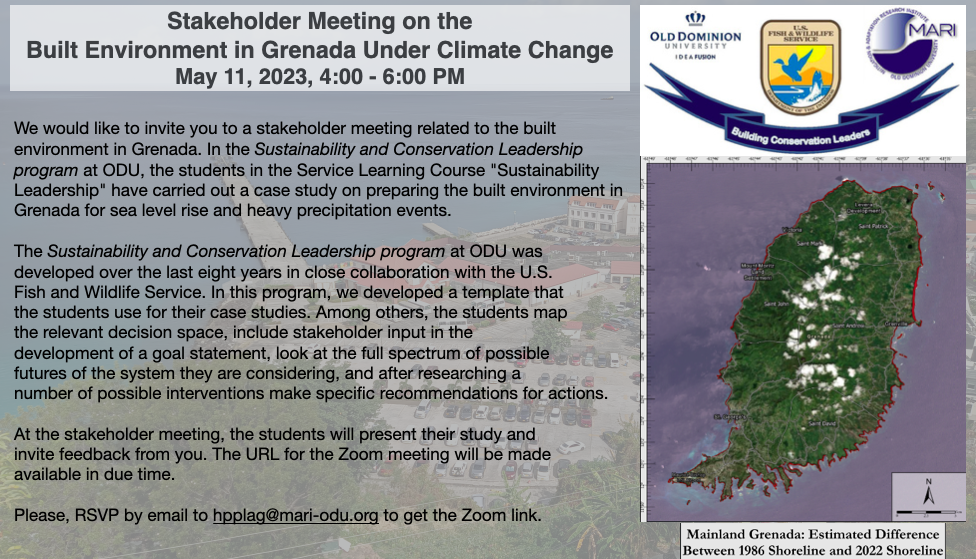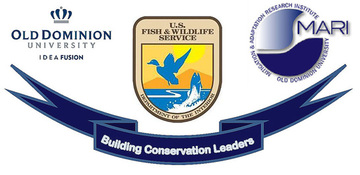
View the Agenda ...
Introduction
Creating a more sustainable society presents a serious challenge and at the same time an enormous opportunity. Most sustainability-related challenges present wicked problems to society and can best be addressed in a participatory collaborative approach. The students in this course gained experience in participating in such an effort focusing on a real-world problem.
The real-world problem addressed in this course relates to the future of the small island state (SIS) Grenada. The problem to be focused on is still under discussion with the Planning and Development Authority in Grenada. The students will cary out a case study using the MARI case study templete with the goal to make recommendations to the Planning and Development Authority.
The problem will be tackled using a transdisciplinary collaborative approach. A core element of this approach is a participatory modeling effort. Each student is representing a relevant stakeholder group and bringing the views, interest and knowledge of this group into the participatory modeling effort. By doing this, the students take leadership for the groups they represent and at the same time integrate into the participatory and collaborate deliberations about the wicked problem. Considering all aspects of balancing the needs of thriving communities and healthy ecosystems in a systems thinking mindset introduces them to complexity. Their effort to develop conceptual and stock and flow models (SFMs) that represent all relevant stocks and flows and the essential variables that are important for impacting the trajectory of the system of systems model helps to develop their skills in addressing the complexity inherent to real-world problems.
Sustainability also requires foresight with respect to the wide spectrum of possible futures, and the students' efforts to develop this foresight utilizes a scenario-based approach to explore the spectrum of possible futures under climate change and a dynamic development of population and economy. Based on an understanding of the relevant decision space for the watershed considered, the students will develop a set of possible interventions to ensure a trajectory of the area towards the desirable future of thriving communities embedded in a healthy environment. Finally, they will make recommendations for viable interventions.
|
Learning By Experience: Reflections of the Students
The course is part of a tripple loop of learning by experience. In the first loop in the 466W/566 courses, students have been carrying out individual case studies of real-world wicked problems. By doing so, they got introduced to the case study template and the transdisciplinary approach to wicked problems, which requires systems thinking. In 467/567, they go through the second loop in a service learning setting, in which the students work as a group on a case study of a societal problem for a stakeholder. The third loop is the subsequent internship, in which the students again cary out an individual case study of a problem relevant to the host institution.
In all three loops, the students prepare individual reflections on the learning experience and the outcomes for them personally. In the 467/567 courses, these reflections include a reflective video and personal written reflections.
The Case Study Project: Preparing the Built Environment, Society, and Economy in Grenada for Sea Level Rise and Extreme Precipitation Events
In Spring 2023, the service learning project addressed the challenges sea level rise and increasing extreme precipitation events pose to the built environment and the people in the SIS Grenada. SIS are embbeded in, and depended on, a global and regional environment under a permacrisis. This poses many threats to the environment of the island as well as supply chains including food, material resources, energy, and humans. Preparing for this uncertain future poses a challenge to governments and people in SIS. A particular threat to people, environment, and economy is in the potential sea level rise and the likelihood of increasingly frequent and extreme precipitation events. The Planning and Development Authority of Grenada is developing a strategic plan for the country for the next 30 years, and the case study provides input to this strategic plan.
Case Study Report
The case study report prepared in collaboration of all students provides recommendation to the Planning and Development Authority and other stakeholders in Grenada.
|


